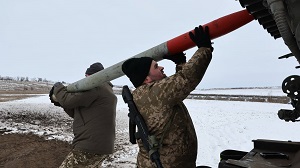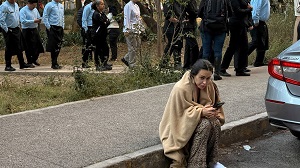The Arabs and the Fifth Column - By Zuhair Al-Harthi, Alarabiya
It seems that the spread of Turkish and Iranian influence and their violations on Arab lands are the most prominent topic of conversation in the Arab world today. They are challenges and dangers that threaten honor, pride and sovereignty, and an attempt to bring old tragedies of history back to life.
After everything that has happened and continues to happen in our Arab region, whether, in the Gulf or North Africa, many are pondering: How were these two regional states able to penetrate the Arab world’s social fabric, target its national security and rob it of its wealth and resources. How were they able to exploit Arab individuals who belong to these nations, recruiting them to implement the agenda of this or that state?
Infiltration is an old – new behind the scenes approach in international relations, and the aim may be achieved with different tools depending on the features of the state and society. For instance; spreading ideology (such as the ideology of the Muslim Brotherhood, the opportunistic relationship between Erdogan and al-Sarraj, the Qatari regime’s relationship with the Brotherhood, the Ennahad Movemnt’s disruption of Tunisian parliament or even the story of the Saudi official Saad al-Jabri with the Brotherhood.
Secondly, there are mutual interests and benefits (the Iranian regime’s relationship with Qaeda, Hamas, and the Muslim Brotherhood in Egypt; for example), and thirdly, sectarianism (recruiting some among the Arab Shiites for political, security and military purposes, such as Hezbollah in Lebanon and the Houthis in Yemen).
Ofcourse, we must distinguish between Iran and Turkey’s political relationships in Arab states, which are subject to norms of international relations, and their relationships with influential Arab individuals who are used as bargaining chips when needed, without forgetting the faction scattered across the Arab world that continues to reinforce the Brotherhood’s Nestorian dreams and its transcontinental wings. This is accompanied by the absence of an Arab regional system, even with the Saudi diplomatic efforts that are cause for optimism. Nevertheless, the efforts made on the Libyan issue perhaps indicate that Arab cooperation in the face of external risks will be restored, and I will perhaps go over this extensively in a subsequent article.
Memory quivers are packed with names of leaders and figures, although we are only criticizing their explicit actions here, not defaming or demeaning. Some are absent from the scene, while others still wield influence, playing their role of furthering external interests at the expense of the interior, such as Hassan Nasrallah, Fayez Al-Sarraj, Nouri Al-Maliki, Hadi al-Amiri, Bashir, Turabi, Hasan Al-Mushaima, Bebran Basil, Saeed Al-Shehabi, Abdul-Malik Al-Houthi, Hakim Al-Mutairi, and the list goes on and on.
Those and others sought to go against the tide. They do not conceal their allegiance to foreign powers and implement the agendas of Iran, Turkey, or the Brotherhood. Thus, we cannot claim that their links to these states are exclusively ideological; rather, interests and benefits come into play, and a deep study is required to understand the reasons from this.
Traitors to the nation can be dealt with directly, as the threat they pose is obvious, but it is most dangerous and harmful when it comes from someone you would not expect to behave in such a way; it makes us question how best to bring down the Safavid and Ottoman projects before they dominate the Arab world. Those who claim to be in your camp but work to undermine you secretly are the real calamity, the “fifth column”.
Historians tell us that the term "fifth column" arose some 80 years ago, during the Spanish Civil War, while Madrid was besieged by the right (revolutionaries) led by Franco, who turned against the left despite the latter having won the elections. In a speech given by one of the generals of the time, he spoke of four columns besieging the Republicans in the capital and said that there was a "fifth column" of coup supporters, by which he meant the civilian supporters of the revolution. From that day on, the term was given to spies colluding with countries hostile to their state. It became more and more common as a result of the Cold War between the United States and the Soviet Union.
Twenty percent of the Arab countries have had bitter experiences, some of which were classified failed states due to the lack of a citizenship project, because of the flawed policies, arrogance, and tyranny of their leaders (Gaddafi, Saddam, Bashir, Bashar al-Assad, Ali Abdullah Saleh and others).
The "fifth column" rises to the surface when the state's fragility is felt from within and when it lacks a framework for containing disputes and regulating its political, economic, and security relations. These actors use tools to impede their societies’ progress, like inflaming sectarianism and sectarian conflict, which leads to a push for a secession and division, and sparking partisan and intellectual disputes. All of this reinforces division and divergence, and this leaves the door to external interference wide open.
The dangers posed by these challenges to the nation-state are exacerbated when its constitutional institutions are almost completely irrelevant and civil society institutions are fragile, despite highlighting economic crises, such as poverty, limited resources and capabilities, illiteracy, and unemployment.
This climate facilitates the movements of opportunists and self-interested, as they are easy pickings for lurking enemies to exploit, and so they volunteer to reinforce them. They do dexterously, as they only care about themselves, and the county is of absolutely no significance to them. They are a segment of society that cannot live with social stability, as they are "spies or agents who gather information, work to sabotage and orchestrate economic crises, in addition to influencing public opinion by spreading rumors, repeating lies, and falsifying facts", even carrying out criminal and terrorist acts.
Targeting the Arab world, infiltrating its societies, and compelling them to further agendas that harm their countries are long-term strategic goals that Iran and Turkey have been working on for a long time, employing all the means available to them, from spreading rumors, using media and providing material incentive and immediate rewards. It is a strategy that is prone to fail when the home front is strengthened through the constitution, citizenship, transparency, freedom, and accountability, and when important positions are occupied by honest and loyal official, which would end the journey of clients, traitors and those who sold their consciousness.




